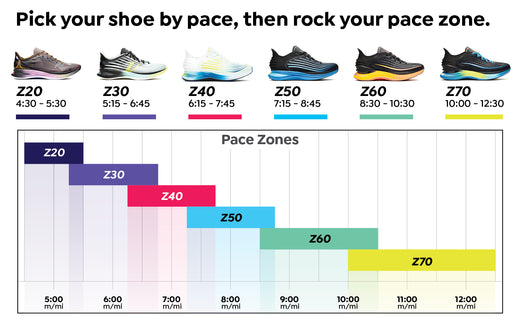Do carbon fibre shoes with a Pebax midsole give greater running economy?
Well how true is the hype?
In a well structured research study, published in the Scandanavian Journal of Medicine and Science in sports1, the researchers compared the running economy (RE) in 22 runners of:
- New running shoes with PEBA (Polyether Block Amide) foam
- New running shoes with EVA (Ehtyl Vinyl Acetate) – the traditional midsole material
- The same PEBA shoe after 450 km (270 miles) of running in an asphalt surface.
- The same EVA shoe after 450 km (270 miles) of running in an asphalt surface.
So what did they find:
New PEBA shoes had a significantly lower RE compared to the new EVA shoes.
- After 450 km
- There was a significant increase in RE in the old PEBA shoe compared to the new shoe.
- There was no significant change in RE between the new and old EVA shoes
The conclusion of the study was:
“There is a clear RE advantage of incorporating PEBA versus EVA in an Advanced Footwear Technology when the models are new. However, after 450km of use, the PEBA and EVA shoes had similar RE.”
The Vimazi shoe range use an EVA polymer that will last the test of time. So, if you want to optimize your performance for all of your training miles and reduce the impact forces, the Vimazi shoe is the choice for you. Go to our shoe selector to optimise the model that is right for you. (do link)
- Rodrigo‐Carranza, V., Hoogkamer, W., González‐Ravé, J.M., Horta‐Muñoz, S., Serna‐Moreno, M.D.C., Romero‐Gutierrez, A. and González‐Mohíno, F., 2024. Influence of different Midsole foam in advanced footwear technology use on running economy and Biomechanics in trained runners. Scandinavian Journal of Medicine & Science in Sports, 34(1), p.e14526. This paper is open access at: https://onlinelibrary.wiley.com/doi/full/10.1111/sms.14526




